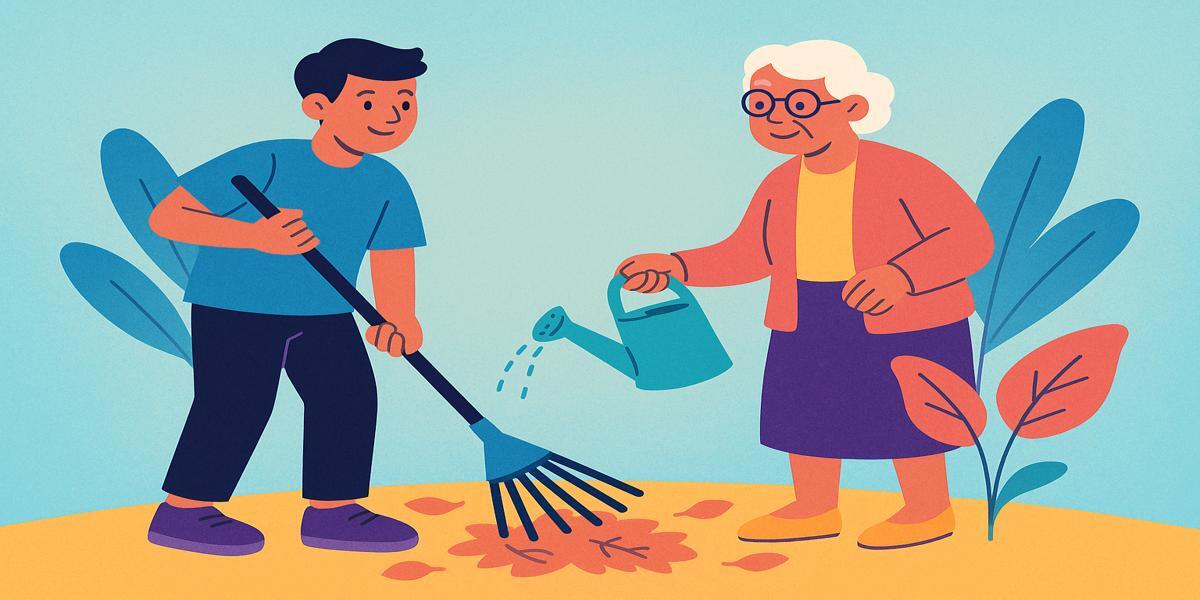Parents often joke that their teens will do anything to avoid a broom or vacuum. So imagine this: a group of high‑schoolers turning up at a senior citizen’s home, happily dusting shelves, planting flowers and even teaching the resident how to use a tablet. In the little town of Suffield, Connecticut, that’s exactly what’s happening. A new program called Suffield Sidekicks matches local seniors with teens who help with light chores and yard work. There’s no cost for older participants, and the benefits go far beyond a tidy living room. Seniors report feeling less isolated and more connected. Teens earn a modest paycheck – and, more importantly, a new appreciation for elders. One young volunteer described it as “a chance to do good for your community and yourself.”
Watching a teenager rake leaves while chatting with an 80‑year‑old neighbour feels like a small miracle in a world of screens and instant gratification. Yet this is more than a feel‑good story. Psychologists have long argued that chores build confidence, empathy and executive functioning skills in kids and teens. A Harvard study found that children who regularly take on household tasks develop better work ethics and higher life satisfaction as adults. Dr. Elizabeth Harris of University Hospitals points out that chores aren’t just about cleaning: they help kids understand what it takes to maintain a home, making them more grateful for the work others do. Structure and routine also boost their mental flexibility and ability to manage time – skills that come in handy long after the laundry is folded.
For families in Egypt and across the Middle East, the Sidekicks model offers a few takeaways. First, community matters. Even if there isn’t a formal program nearby, pairing your teen with a grandparent or neighbour for a weekly chore session can spark conversations and break generational silos. Second, paying teens for chores doesn’t have to be controversial if you frame it as earning rather than entitlement. When kids work for spending money, they start to link effort with reward – the foundation of financial literacy. Finally, letting teens take the lead teaches them they are capable. Instead of hovering, invite them to plan a task, manage their time and even teach an elder something new. You might be surprised at how much they rise to the occasion.
So next time your teen complains about taking out the trash, remind them: somewhere, kids their age are raking leaves for seniors and loving it. Chores are not punishment; they’re a path to empathy, independence and even a little pocket money. And who knows? Maybe the sweetest harvest of all isn’t the paycheck, but the stories and wisdom exchanged over a pile of leaves.
Sources:
– Suffield Sidekicks – Teens Helping Seniors, The Suffield Observer (November 1, 2025)
– Chores Are Good for Kids: Here’s Why, University Hospitals (July 18, 2025)
Title: لما المراهقين يكنسوا الورق ويحصدوا حكمة: شغل البيت بفلوس
الأهل دايماً بيهزروا إن ولادهم المراهقين ممكن يعملوا أي حاجة عشان يهربوا من المكنسة أو المسّاحة. تخيل بقى مجموعة من طلاب الثانوية بيروحوا بيت واحد كبير في السن، بينفضوا الرفوف، يزرعوا ورد، وبيعلموه يستخدم التابلت. في بلدة صغيرة اسمها سافيلد في ولاية كونكتيكت ده اللي بيحصل حرفياً. برنامج جديد اسمه «سافيلد سايدكيكس» بيجمع كبار السن بالمراهقين عشان يساعدوهم في شوية شغل خفيف في البيت والجنينة. مافيش تكلفة على الكبار، والفوائد أكبر بكتير من قعدة نظيفة. الكبار بيقولوا إنهم حاسوا بتواصل أكتر ووحدة أقل. المراهقين بياخدوا أجر بسيط – والأهم إنهم بيكتسبوا تقدير جديد لكبار السن. واحد من المتطوعين وصف التجربة إنها «فرصة تعمل خير لنفسك وللمجتمع».
إنك تشوف مراهق بيشيل ورق الشجر وهو بيكلم جار عنده 80 سنة حاجة شبه معجزة في عالم كله شاشات وسرعة. لكن القصة أكبر من مجرد إحساس حلو. علماء النفس بيقولوا من زمان إن شغل البيت بيبني الثقة بالنفس والتعاطف ومهارات إدارة النفس عند الأطفال والمراهقين. دراسة من هارفرد لقت إن الأطفال اللي بيعملوا واجبات منزلية بانتظام بيكون عندهم أخلاقيات عمل أفضل ورضا عن الحياة لما يكبروا. الدكتورة إليزابيث هاريس من مستشفى UH بتقول إن الشغل مش بس تنظيف: هو وسيلة يخلي الأولاد يفهموا يعني إيه تحافظ على بيت، وده يخليهم يقدروا مجهود الآخرين. الروتين والنظام كمان بيقووه مرونتهم العقلية وقدرتهم على إدارة الوقت – مهارات هتفيدهم طول العمر.
للأسر في مصر والشرق الأوسط، نموذج سايدكيكس فيه شوية أفكار. أولاً المجتمع مهم. حتى لو ما فيش برنامج رسمي قريب، إنك توصل ابنك بمجد أو جارة كبيرة في السن كل أسبوع عشان يساعدها في حاجة بسيطة ممكن يفتح كلام ويكسر حاجز الأجيال. ثانياً، دفع فلوس للمراهقين مقابل شغل البيت مش لازم يكون حاجة غلط لو قدمتها على إنها مكسب مقابل تعب مش حق مكتسب. لما الأولاد يشتغلوا عشان يصرفوا على نفسهم، يبدأوا يربطوا الجهد بالمكافأة – وده أساس الثقافة المالية. وأخيراً، إنك تسيب المراهقين يقودوا المهام بيعلمهم إنهم قادرين. بدل ما نفضل حوليهم، إدعهم يخططوا المهمة، يرتبوا وقتهم ويعلموا الكبير حاجة جديدة. ممكن تتفاجئ قد إيه هيكونوا على قد المسؤولية.
فالمرة الجاية اللي ابنك يشتكي فيها من رمي الزبالة، فكره: في مكان تاني، أطفال في سنه بيكنسوا الورق لكبار السن ومبسوطين. شغل البيت مش عقاب؛ ده طريق للتعاطف والاستقلالية وحتى شوية مصروف. ومين عارف؟ ممكن أجمل حصاد مش الأجر، لكن القصص والحكمة اللي بتتبادل فوق كومة ورق.
المراجع:
– Suffield Sidekicks – Teens Helping Seniors, The Suffield Observer (November 1, 2025)
– Chores Are Good for Kids: Here’s Why, University Hospitals (July 18, 2025)







Leave a Reply
You must be logged in to post a comment.